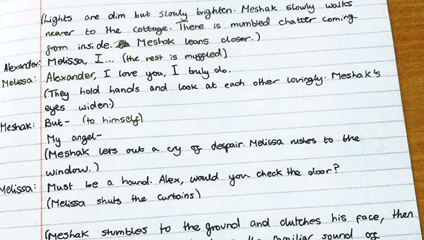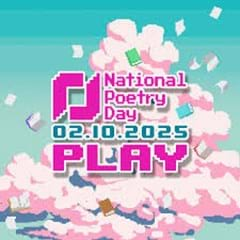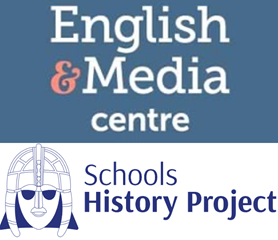As previous blogs might suggest, I’ve been working hard on our group work project It’s Good to Talk, as well as thinking about knowledge in English for a course we’d been hoping to run at EMC. For both, I’ve been reading key works from the past, studies on talk and group work, and current research too.
Why knowledge matters… but Hirsch doesn’t convince me
One text I decided to spend time on was E.D. Hirsch’s Why Knowledge Matters[1] – not just a quick skim-read but a careful, thorough, ‘note-taking’ read. I wanted to do justice to a book and writer who has been proving so influential. I imagined that I might disagree with some aspects but take others on board, and be, in some way, challenged and impressed. However, I was deeply disappointed on all counts – by its polemical rather than academically rigorous style, its lack of a thorough evidential basis and the gaping holes in some of the key arguments. The discussion in the book relates particularly to ‘the language arts’ (English and literacy, in UK terms), so I was especially interested in what Hirsch had to say.
One central idea is that vocabulary and knowledge should trump everything else in the teaching of ‘language arts’ and development of literacy. The reason given is that students’ scores on reading tests in the US fall off at the age of 17 and Hirsch suggests that it’s because a.) poor vocabulary and lack of content teaching make students less effective readers than they should be and b.) the reading tests themselves are based on previously unknown material, on any, random subject. He attacks the tests, saying they’re not good reading tests if they’re not testing topics where the vocabulary and knowledge have already been taught. These two arguments, put together, seem to me to be deeply flawed and mutually incompatible. A reading test is, by its very nature, supposed to test how well someone manages with a text that is not familiar, with vocabulary and content that is not necessarily known. The point of a reading test is to say to the world that this person is competent enough to grapple with unknown material of a certain level of challenge and make something of it. If the knowledge and vocabulary has been taught in advance, then it’s not a reading test; it’s a test of subject knowledge, of the kind that is done perfectly justifiably in all the other subjects within the curriculum, whether it be History, Geography, RE or Biology. The overriding emphasis on vocabulary and knowledge also leads to an assertion by Hirsch that the best way of pupils acquiring these is by teachers explicitly teaching these to them in a well-ordered sequence. This is superficially appealing. Teach vocab, learn topics, be tested on topics, prove that you know more and can read more. But we know from research that the best indicator for pupils’ future educational attainment overall is how much they read, and how much they read for pleasure. Reading itself teaches pupils far more knowledge and vocabulary than could ever be taught, in however systematic a programme of teaching. You read in order to learn knowledge and vocabulary, as well as learning knowledge and vocabulary in order to read.
This is just one of many deep reservations. I could talk about what Hirsch makes of France and its appalling failures in literacy as a result of progressive policies (or not, if you choose to read different reports from the ones he quotes!), or his concept of what knowledge is, which seems fixed, static, derived from historical versions of subject domains, rather than the living ones of current academic practice, and based on a model of pouring information in and finding ways of ensuring that not too much leaks out. Information and recall of information dominate.
In comes Applebee
At the same time as reading Hirsch, in my search for interesting research on group talk, I came across an article by someone called Arthur N. Applebee. Since reading it, I have been on an Applebee trail, ordering copies of his books and downloading articles from Jstor. I have been captivated by everything I have read, not just by the thoroughness of the research and the persuasiveness of the arguments but also the clarity of thought and expression. In groups of teachers and educationalists, like a latterday Ancient Mariner, I’ve been returning again and again to my latest obsession, asking, ‘Who’s heard of Applebee?’ Silence every time. Everyone has heard of Hirsch, so why has no-one in the UK heard of Applebee? Like Hirsch, Applebee (who died in September 2015) was an American educationalist. Associated with the Center on English Learning and Achievement (CELA), established in 1987, he collaborated with many other academics, including Judith A Langer, Martin Nystrand and Adam Gamoran. There is a substantial body of their work on the ‘language arts’, from books on reading and studies on what effective schools are doing in the disciplines of English, to the significant impact of discussion-based classrooms on pupil achievement. In a particularly substantial piece of research (2003)[2], they analysed 64 classes, with 1,412 students and drew the conclusion that:
The approaches that contributed most to student performance on the complex literacy tasks that we administered were those that used discussion to develop comprehensive understanding, encouraging exploration and multiple perspectives rather than focusing on correct interpretations and predetermined conclusions.
This built on the many previous research studies that they quote in the research survey that precedes their own study.
One of Applebee’s most important books was written in 1996 and is called Curriculum as Conversation.[3] It makes for compelling reading. In a short blog, I can only hope to flag up a few major points on how it speaks to me, where Hirsch doesn’t.
First, Applebee sees knowledge as, what he calls, ‘knowledge-in-action’. This contrasts with knowledge purely as a past tradition that you look back to and learn about. ‘Knowledge in action’ is learning about doing the discipline and involves taking thinking forward into the present and future. He says that what young people talk about in school may be ‘at some remove’ from what graduate students discuss in seminars but the discussions are ‘nonetheless part of an exploration of the same culturally significant domain for conversation.’ For Applebee,
In learning to do school, students are in fact learning to enter into culturally significant traditions of knowing and doing. […] The words that are used, what counts as knowing and doing, are shaped by what other individuals have said and done, by the conversations that have gone before. This is the irreducible nature of tradition, which constitutes the present matrix out of which we act.
This strikes a chord for me in everything we do at EMC and it also strikes a chord with all that we discover through our close relationships with colleagues in Higher Education and with developments in the subject of English in the academy. Take for instance, Robert Eaglestone’s book Doing English[4] – due to appear in its fourth edition in July. Addressed directly to students, both at A Level and undergraduate level, it seeks to establish the corner stones of what it means to study the subject English. Eaglestone’s account of knowledge in the discipline of English is in close accord with Applebee’s description of knowledge in English classrooms. Here’s an extract from Eaglestone’s introduction to the forthcoming edition:
English is like a long conversation through time. Like any conversation, it moves over various linked themes; it has quarrels and agreements; people talk at the same time, struggle to be heard or shout louder and louder to dominate the debate; people suggest fresh ideas (‘what about this?’) or respond to earlier ones (‘can we just go back to…?’); there are newer and older participants; like all proper conversations, part of it concerns the point of the conversation itself (‘can we please focus on why are we discussing this?’); and now you, doing English, have joined this conversation and will change what’s said next.
For Eaglestone, and Applebee, knowledge is not just facts and ideas as inert material to be learned, but rather it is living and changing, a process of learning how the discipline operates, what its practices are, what is significant within it, how to ‘do’ what others within its traditions have done and continue to do.
Should we not be looking to the academic traditions of our own subject, as represented by its most eminent living practitioners, to determine how we define knowledge within it? If so, we come to rather different conclusions about what and how we should teach our subject than those provided by Hirsch.
Applebee is also very interesting on the idea of the curriculum as a fixed and highly structured ‘catalogue’ of items to be covered. He explicitly references Hirsch on this and suggests that the seemingly ordered and disciplined sequences of learning that emerge from a ‘catalogue’ structure for the curriculum, actually prove to be deadly and singularly fail to fulfil the task of teaching students to think within subject disciplines. Instead, Applebee argues for the curriculum as conversation. He says,
If we do not structure the curricular domain so that students can actively enter the discourse, the knowledge they gain will remain decontextualized and unproductive. They may succeed on a limited spectrum of school tasks that require knowledge-out-of-context, but they will not gain the knowledge-in-action that will allow them to become active participants in the discourse of the field.
Applebee does not shy away from acknowledging that advocates of ‘progressive theories’ of knowledge have themselves sometimes lacked the kind of rigour and efficiency that is required and have relied too heavily on gifted teachers and isolated examples – ‘vignettes’ he calls them – of great work, in place of ‘well-articulated procedures of curriculum and instruction’. He says that there are some ‘well-justified criticisms of progressive theories’ which have allowed students to ‘wallow in their own ignorance’ or have a ‘long recapitulation of previous discoveries.’ Applebee is no zealous proponent of ‘progressivism’ right or wrong! And don’t we all agree with that view. None of us wishes to be apologists for poor practice. But he does argue that curricular ‘conversations’ can be structured around big areas of cultural significance and that these alone can offer the real deal for students in terms of serious learning in subject domains. He says,
schooling should be organised to help students enter into culturally significant domains for conversation, themselves representative of broader cultural traditions of knowing and doing. By placing the emphasis on entry into such conversations, I seek to ensure that students will emerge with knowledge-in-action rather than knowledge-out-of-context. By stressing culturally significant domains, I seek to ensure that education is organised around living traditions that look to the present and future as well as the past. And by stressing domains for conversation, I seek to ensure that there is an emphasis on the structure and interrelatedness of ideas and experiences within a domain.
I’m still reading Applebee, and I’m also getting new leads and following up the work of Langer, Nystrand and others who have collaborated with him over the years. Langer’s work on reading as ‘envisionment’, for instance, is fascinating and also has much to offer us in thinking seriously about the complexity of the process itself and how to teach it.
This blog is the start of a conversation – a conversation about knowledge of the kind that Applebee advocates so cogently. And the conversation with teachers and educators of English might continue, using the question I started with. Why on earth aren’t we talking about Applebee?
References
[1] Hirsch, E.D. Why Knowledge Matters – Rescuing our Children from Failed Educational Theories. Harvard Education Press (September 2016)
[2] Applebee, Arthur N., Judith A. Langer, Martin Nystrand and Adam Gamoran. 'Discussion-Based Approaches to Developing Understanding: Classroom Instruction and Student Performance in Middle and High School English' Source: American Educational Research Journal, Vol 40, No 3 (Autumn, 2003) Published by: American Educational Research Association
[3] Applebee, A. Curriculum as Conversation, University of Chicago Press (May 1996)
[4] Eaglestone, R. Doing English – A Guide for Literature Students. Routledge (4th edition due out in July 2017)
Further Reading
Durst, R.K., George E. Newell, James D. Marshall. English Language Arts Research and Teaching: Revisiting and Extending Arthur Applebee’s Contributions Routledge (Apr 2017)




